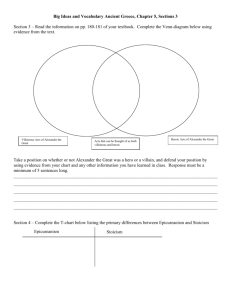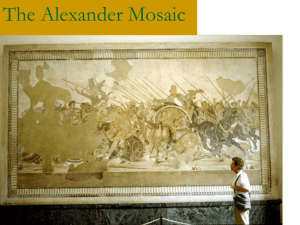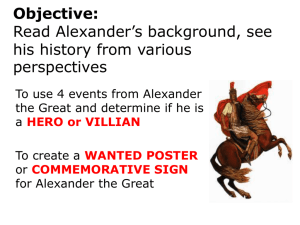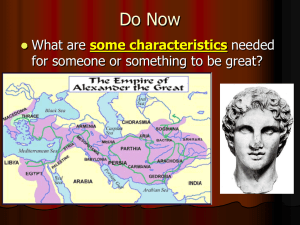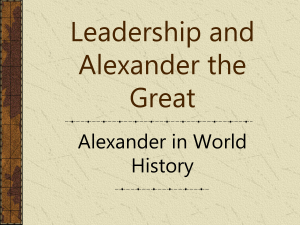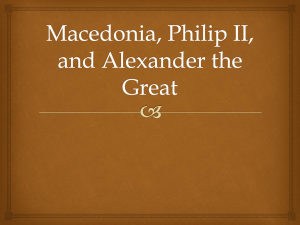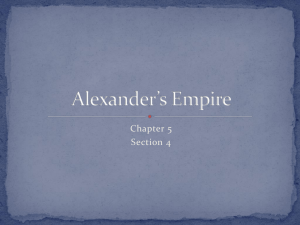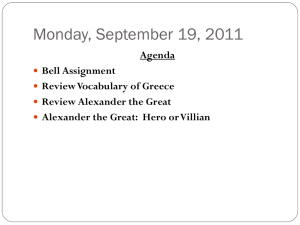Alexander the Great
advertisement
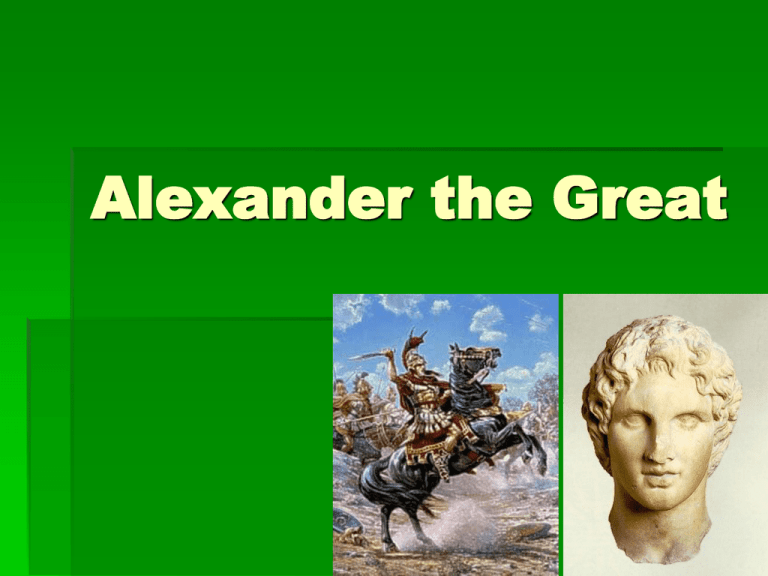
Alexander the Great Background Born in 356 BCE – in Macedonia Father, Philip II, began conquest of Greece in 359 BCE using 3 methods: bribery, war, & marriage By 338 BCE, he controlled all of Greece except Sparta Philip’s goal was to conquer Persia, but was assassinated Alexander became king at age 20 Alexander avenged his father by conquering Persia Moved on to conquer Syria, Phoenicia, Egypt, Mesopotamia, and the Indus River Valley His army refused to continue and at 33, Alexander dies under mysterious circumstances. After his death, the empire was divided by his generals and ultimately fell apart. Lasting effect of his rule: Hellenistic Culture (combination of Greek and Middle Eastern culture) and major advancements in Math and Science. Alexander the Hero Background Conqueror and ruler of an enormous empire Considered the greatest military leader of all time Spread Greek culture and ideas throughout the ancient world Showed an interest in the culture of people he conquered Alexander the Villain Background Accomplishments were due to the powerful military his father King Philip II, left him Ruthless and Cruel with a fierce temper Mistreated his own loyal advisors and soldiers Conquests of Alexander the Great Alexander in Thebes Alexander in Thebes Hero Unified all of Greece by putting down the rebellion in Thebes. Showed compassion toward some of the rebels. Villain Brutally put down the attempt of the people of Thebes to declare their independence and freedom Killed more than 6,000 Thebans and sold more than 20,000 Thebans into slavery and destroyed the city. Alexander in Egypt Alexander in Egypt Hero Welcomed in Egypt more as a savior than as an invader and enthroned as king. Founded the city of Alexandria which became a great center for learning and Greek and Near Eastern culture Villain Only founded the site for the City of Alexandria. Emphasis on Greek culture and scholarship excluded the Egyptians form any key role in the city’s development. Alexander in Persepolis Alexander in Persepolis Hero Defeated the mighty Persian army at the Battle of Issus. Then conquered the Persian Empire. Showed respect for the native people by appointing Persian governors in conquered territories and allowed people to continue to practice their religious traditions. Villain Military campaign against Persia was brutal and relentless, without regard for the casualties of either the Persians or the his own troops. Plundered the riches of Persepolis and burned it to the ground destroying the culture. Alexander in India Alexander in India Hero Defeated the army of the Indian king Porus, overcoming heavy rains and the army’s use of elephants. Interested in Indian culture and religion Questioned Indian holy men to learn more about Hinduism Villain Forces spent three years ruthlessly putting down any resistance, slaughtering males and selling females and children into slavery. His own troops finally demanded that he turn around and go home.
